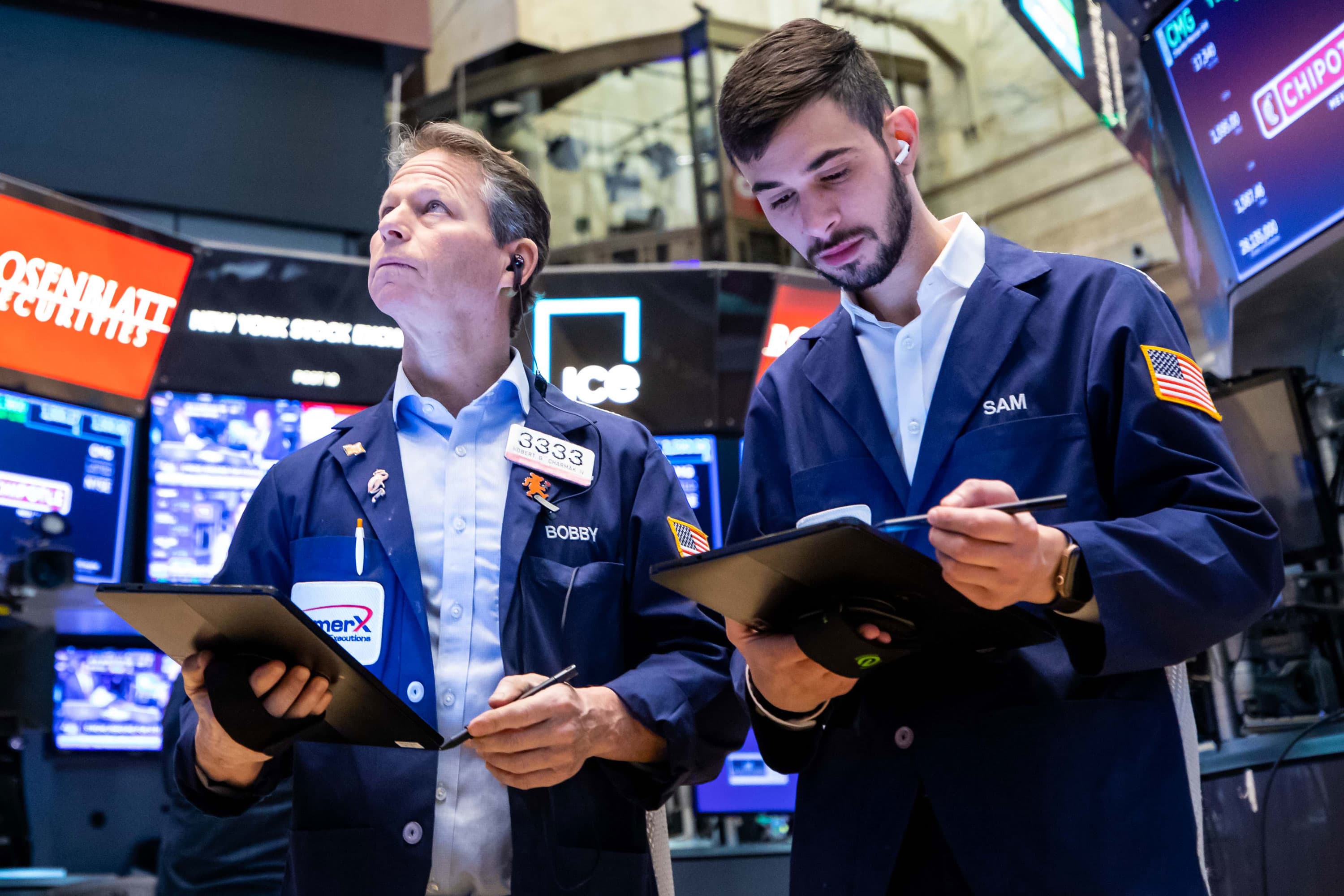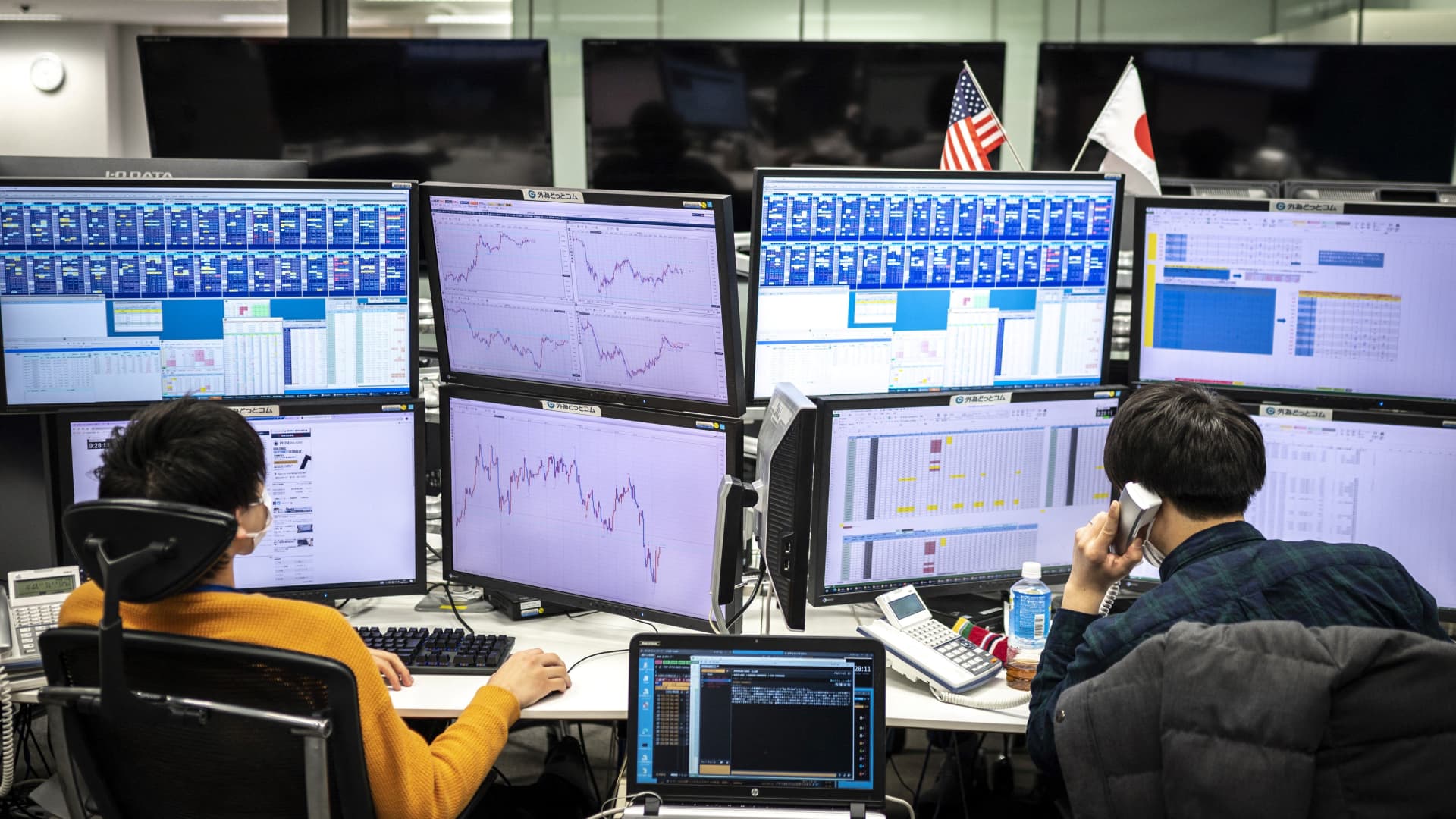Stock market may become a 'meat-grinder of forlorn hope' for dip-buyers
Investors looking for value in the stock market during the ongoing downturn may be "deluding themselves," according to Sean Corrigan, director at Cantillon Consulting.

LONDON – Investors looking for value in the stock market during the ongoing downturn may be "deluding themselves," according to Sean Corrigan, director at Cantillon Consulting.
Fears that central banks will have to hike interest rates aggressively to curb inflation — at the risk of quashing growth as the global economy suffers concurrent hits from the war in Ukraine and other supply shocks — have led to broad selling across global markets in recent months.
The S&P 500 closed Thursday's session down 18% from its all-time high, approaching bear market territory, while the pan-European Stoxx 600 is down almost 12% year-to-date and the MSCI Asia ex-Japan has shed 18.62% since the turn of the year.
Tech and growth stocks, which are most vulnerable to sharp rises in interest rates, have suffered particularly steep declines, with the tech-heavy Nasdaq 100 down more than 29% from its record high last year.
The negative start to the year followed a rally that had propelled global stocks from the depths of the initial coronavirus crash in March 2020 to record highs, with growth companies and tech titans leading the charge.
Some investors have chosen to see recent weakness as a buying opportunity, but Corrigan suggested that faith in the bull run could be misplaced given the macroeconomic condition.
In a note Friday, he suggested that since a substantial portion of holders of the growth stocks that had performed so well up to this year were using borrowed capital, others might be "swept away when the tide at last begins to ebb."
"People always say the market comes down on profit taking – it comes down on loss realization. The guy who sells at the top sells to the next two guys, who realize it's not going to hold, who sell to the next guys and if any of those are leveraged, we're in trouble," he told CNBC's "Squawk Box Europe" on Friday.
"And if they're losing a lot of money in one market, which might be somewhat peripheral to the real thing, there's another old expression – pulling up the flowers to water the weeds. You sell the other thing to pay your margin calls or to try and reconstitute our finances, so it can spread, and we are clearly in that phase at the moment."
Despite the risk-off sentiment that has prevailed of late, the S&P 500 remains more than 16% above its pre-Covid high in early 2020, and Corrigan argued that the world is not in a better place than it was at that stage.
"Even people who are trying desperately to convince themselves that somewhere down here, there must now be value just because the asking price is lower, are possibly still deluding themselves," he said.
Given shortages and spiraling costs for "staples of life" such as energy and food, which are squeezing household incomes the world over, Corrigan contended that consumer focus has shifted from the companies whose shares most enjoyed the post-Covid rally.
"We have problems with energy, we have problems with food, we have problems with all the staples of life. Is this a time you're worrying about spending $2,000 to buy a cycle to pedal away in your own home? Well clearly not, which is why Peloton has been crushed," he said.
"But how many other types of companies like that are now somewhat superfluous to the basic problems of existence with which we for the first time possibly in two generations have been confronted?"
Peloton shares have plunged almost 60% since the start of the year.
Acronym arguments deteriorating
Other speculative assets, such as cryptocurrencies, have also cratered as growth concerns supersede inflation worries as the primary fear for investors, while bonds and the dollar – traditional safe havens – have rallied.
In a research note Friday, Barclays Head of European Equity Strategy Emmanuel Cau said the typical acronym-based arguments that keep investors in equities — such as TINA (there is no alternative), BTD (buy the dip) and FOMO (fear of missing out) — were being challenged by the worsening growth-policy trade-off.
Central bank policy and rhetoric has been a key driver of daily market action in recent months as investors look to assess the speed and severity at which policymakers will tighten in order to curtail runaway inflation.
Having adopted unprecedentedly loose monetary policy to support economies through the pandemic, central banks now face the tough task of unwinding that stimulus amid a new barrage of threats to growth.
"Without a trigger to ease recession anxiety, this may continue, but the panic button has not been hit yet. And while highly speculative assets have collapsed, we see little evidence of retail (investors) giving up on equities," Cau argued.
Federal Reserve Chairman Jerome Powell acknowledged on Thursday that the U.S. central bank cannot guarantee a "soft landing" for the economy, in terms of containing inflation without triggering a recession.
Corrigan does not expect this faith in the bull market from retail investors to bear fruit, however.
"As for the idea that inflation (i.e. price rises) will soon meaningfully recede, that still seems a distant prospect though, doubtless, every minor abatement will be seized upon as an 'opportunity to buy'," he said in Friday's note.
"The market could well become a meat-grinder of forlorn hope."

 JimMin
JimMin 































